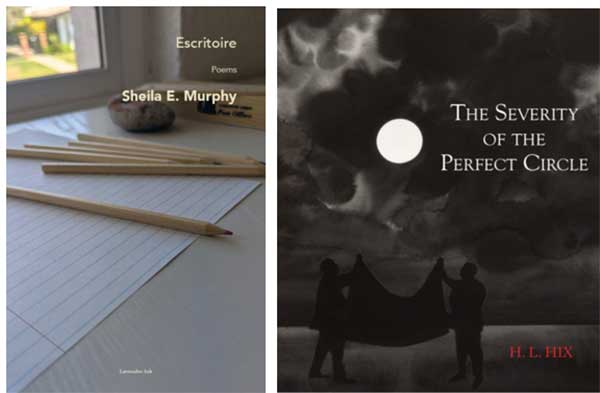
Escritoire, Sheila E. Murphy (Lavender Ink)
The Severity of the Perfect Circle, H.L. Hix (BlazeVOX)
Sheila Murphy’s poetry always managed to surprise this reader, with its unusual musicality and associative language, it’s mix of seemingly distanced but also emotionally charged and possibly autobiographical or confessional content. Escritoire is no exception, although I detect a new playfulness and self-awareness at work.
The transfer of nouns to verbs is here – ‘I mood myself’ – and the sometimes disrupted syntax but there are simpler and more regular forms than in some of Murphy’s other publications. ‘Bloom’, for instance, is a reflection on knowing the names of flowers, of the narrator’s mother taking her to see hothouse flowers and of being bewitched by names; so much so that she ‘hear[s] the flower / more than see it’. The second half of the poem is a flowing, echoing list of plant names that induce a kind of calm acceptance: ‘I give in to what I hear.’
Elsewhere there is dialogue between moods: ‘I fret versus forget’; a grappling with unexplainable reasons for ‘The squall / The grappling / The merger’ which becomes a statement of survival technique:
I would choose
To resurrect
Recoverable fragments
From what is left
And shall then thrive
(‘Because Reasons’)
and momentary acceptance of the unexpected in poems such as ‘Stilton at the Hilton’, where a delayed flight facilitates time to relax and observe:
Now’s our chance to accidentally
split infinitives, split the groove
with zilch to do but look out
on the pavement lined with tattoos.
I love the fact it remains unsure if the tattoos are on humans or a metaphor for painted signs on the runway or sidewalk; or, of course, both.
Of course, there are poems about the light and desert in Arizona here, poems about love and loss, and about others who Murphy meets. In ‘Early Days’, the subject ‘youngs her way toward me / with an armload of new syllables and words / that I might grasp her meaning’, just as we at times must saturate ourselves in Murphy’s clever and engaging arrangements of words, grappling with ‘some abstract / and necessary effort / one of us must come to understand.’
At first glance, H.L. Hix’s poetry seems to operate with very different poetics. Hix always writes sequences of poetry and his work is underpinned by philosophy as much as creative writing.’ Loops’, the first of two sequences here, plays with defining and/or evidencing terms (such as ‘disappropriation’ and ‘necrognizance’) that are the author’s ‘own coinages’ whilst ‘Orbits’, the sequence that is the second half of The Severity of the Perfect Circle, is made up of texts that each respond ‘to a moment from an entry in Barbara Cassin’s Dictionary of Untranslatables’.
If this seems abstract, distant and removed, it immediately becomes clear that this is not so. The opening poem, ‘acousticenity’ – which plays with the idea of ‘landscape as soundscape’ – presents a narrator obsessed by his neighbour’s trailer; whereas in ‘asent’ the narrator peers down from a dormer window, trying to see into ‘the house of [the] neighbor to the east, whose house is filled with newspapers.
Other invented terms are used to define obsessive and unusual behaviour, to facilitate poems full of ‘goat people’, ‘fences’, ‘postal carriers’, ‘dirt-blur’, porches, raccoons and skunks. It is a charged and unsettling neighborhood that Hix – or Hix’s narrator – documents here.
‘Orbits’ consists of what it suggests, poems circling words that cannot be translated and therefore not defined. Although at times there are more abstract statements here, they are rooted by the persistent ‘I’ of the texts and the observations and engagement with the world surrounding these discourses of meaning:
Every winter snow collects atop the line of mountains to the west. Every
afternoon clouds collect behind it.
(‘Anschaulichkeit’)
I see this lamplit vase of flowers. I remember its sunlit sister.
(‘Gegenstand’)
Like all writers, Hix is grappling with language, meaning and communication, how ‘the implications of our phrases “make sense.”’ And committing to not silencing others. Ultimately, it seems, there is
No way to understand others’ words except as my own, no way to
understand my own except by someone else’s.
(‘Istina’)
Here are two very different contemporary authors both of whose work is worth making our own.
.
Rupert Loydell
(This review was first published by Tears in the Fence)
.
